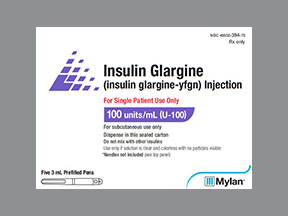
Semglee (yfgn) Coupons & Savings Card – Discount Prices from $11.10
Brand for: Insulin glargine-yfgn
My prescription
Edit
3ML of 100UNIT/ML, Insulin Glargine-yfgn (1 Pen)
Select pharmacy

CVS
$37.94
COUPON PRICE
Walgreens
$11.10
COUPON PRICE
Albertsons
$19.21
COUPON PRICE
Walmart
$26.60
COUPON PRICESemglee (yfgn) savings card
Show this card to your pharmacist
Walgreens
$11.10
BIN
ID
PCN
GRP
019876
LHC68E33B2
CHIPPO
LHX
Powered by
Semglee (yfgn) (Insulin Glargine-yfgn) dosage forms
Dosage Quantity Price from Per unit 3ML of 100UNIT/ML 1 Pen $11.10 $11.10 3ML of 100UNIT/ML 2 Pens $30.20 $15.10 3ML of 100UNIT/ML 3 Pens $49.30 $16.43
| Dosage | Quantity | Price from | Per unit |
|---|---|---|---|
| 3ML of 100UNIT/ML | 1 Pen | $11.10 | $11.10 |
| 3ML of 100UNIT/ML | 2 Pens | $30.20 | $15.10 |
| 3ML of 100UNIT/ML | 3 Pens | $49.30 | $16.43 |
Are semglee and semglee yfgn the same?
Yes, Semglee and Semglee YFGN are the same in terms of their active ingredient, which is insulin glargine. However, Semglee YFGN is the interchangeable biosimilar version of Semglee, meaning it can be substituted for the reference product without the intervention of the healthcare provider who prescribed the reference product.
What is the generic name for Semglee?
The generic name for Semglee is insulin glargine.
Is there a generic Semglee?
Yes, there is a generic version of Semglee. It is known as insulin glargine and is available as a biosimilar to Lantus.
What are the side effects of insulin glargine YFGn?
Insulin glargine can cause several side effects. Common side effects include hypoglycemia (low blood sugar), which may present as dizziness, sweating, confusion, or shakiness. Other possible side effects are injection site reactions such as redness, swelling, or itching. Some individuals may experience weight gain or edema. In rare cases, allergic reactions can occur, which might include rash, difficulty breathing, or swelling of the face, lips, or tongue. It is important for individuals to monitor their blood sugar levels regularly and consult their healthcare provider if they experience any concerning symptoms.
Is semglee insulin being discontinued?
As of the latest information available, Semglee insulin has not been discontinued. It is still available as a biosimilar insulin product used to manage blood sugar levels in individuals with diabetes. However, it is always advisable to check with a healthcare provider or pharmacist for the most current information regarding medication availability.
